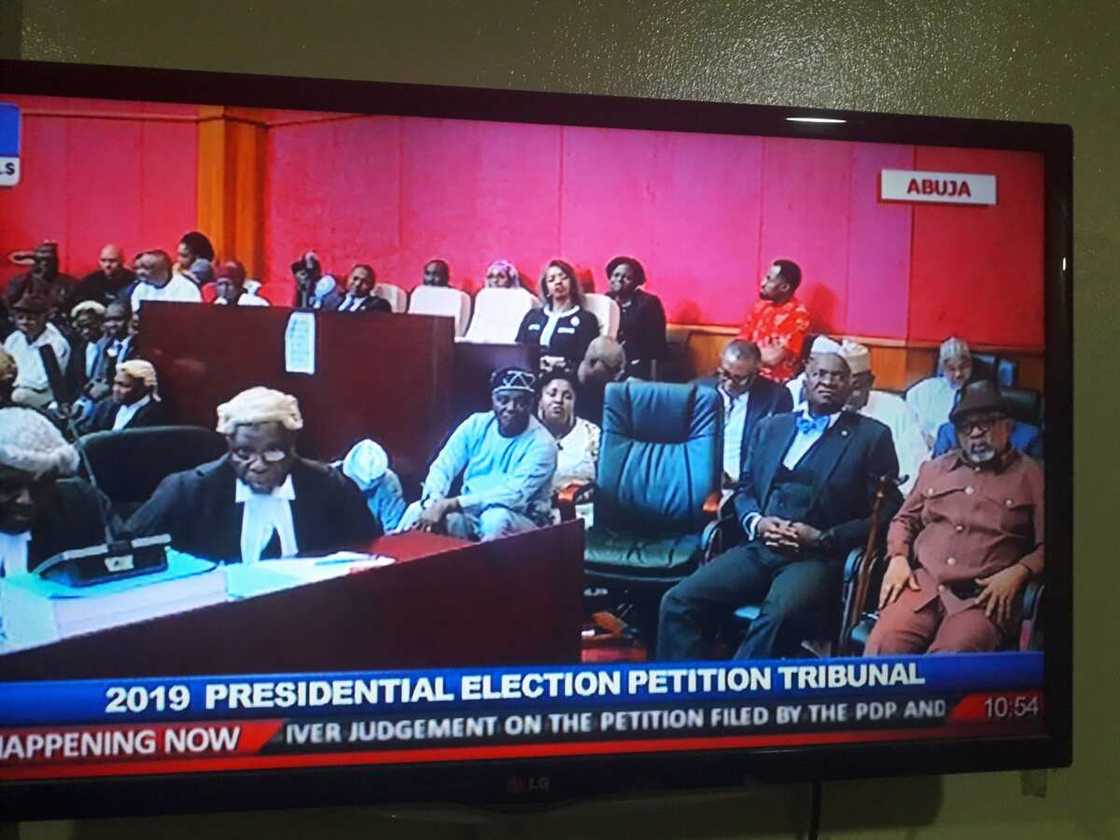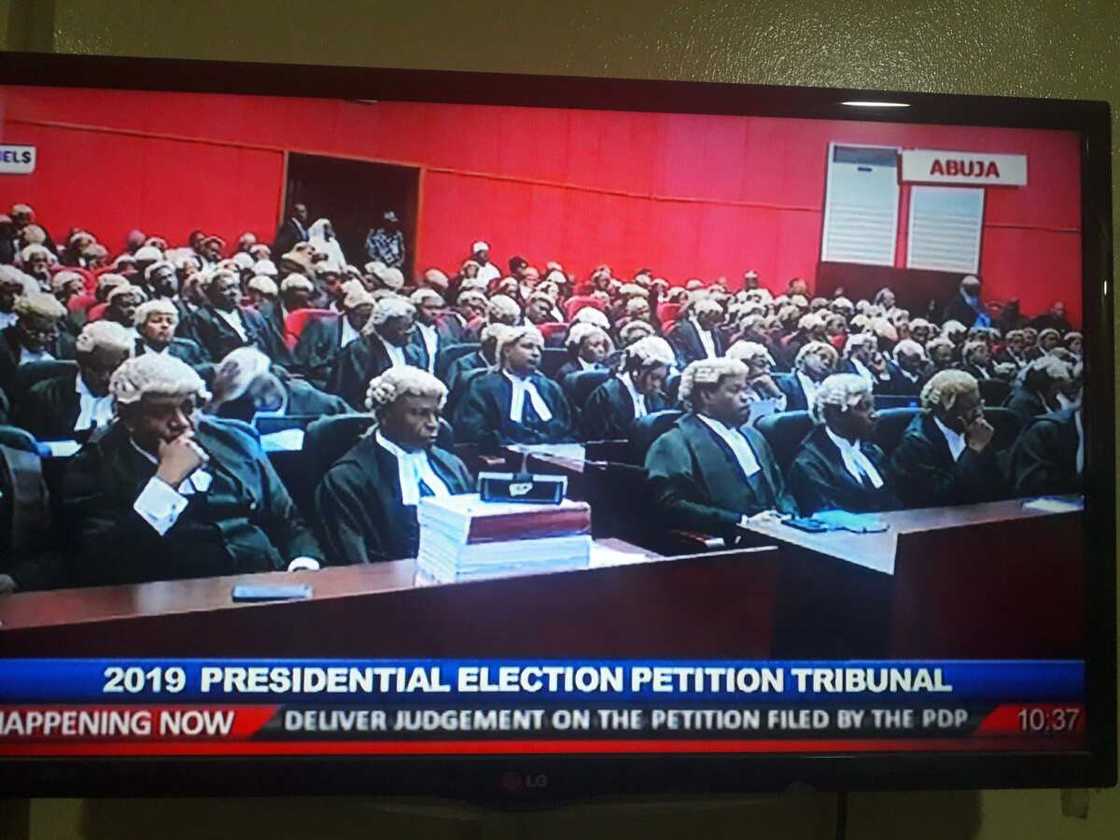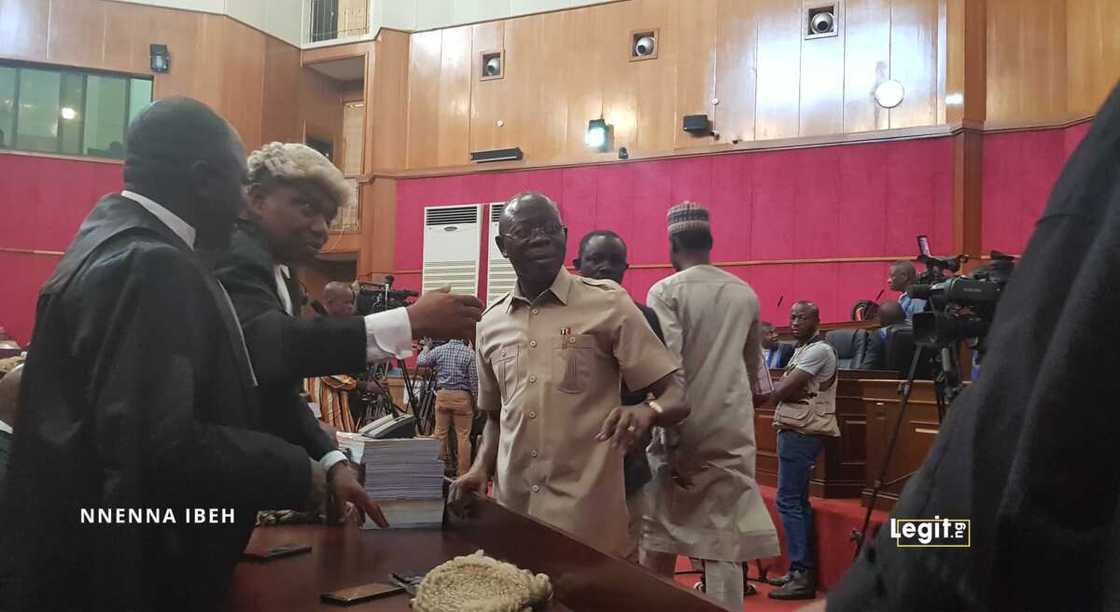Presidential election tribunal: Judgement day as Buhari, Atiku know fate (Live Updates)
The Presidential Election Petitions Tribunal is set to give its final verdict on the petition filed by the Peoples Democratic Party (PDP) and its presidential candidate, Atiku Abubakar, challenging the victory of President Muhammadu Buhari in the 2019 presidential election.
The Independent Electoral Commission (INEC) had declared President Buhari the winner of the 2019 presidential election.
According to the electoral body, Buhari polled 15,191,847 votes to defeat Atiku who polled 11,262,978 to lose the election with a margin of 3,928,869 votes.
However, Atiku and his party claimed they won the election, citing a presidential election result allegedly gotten from INEC's server.
Atiku claimed he scored 18,356,732 votes to defeat Buhari whom he claimed scored 16,741,430 votes.
Having heard the arguments of the PDP, Atiku, Buhari, APC and INEC, the presidential election petitions tribunal fixed Wednesday, September 11, to deliver a ruling on the winner of the 2019 presidential election by 9:30am.
Legit.ng is on ground to provide live updates of the proceedings.
Tribunal dismisses Atiku's petition against Buhari's victory
The court has dismissed Atiku's petition as it affirms Buhari's electoral victory.
Tribunal dismisses alleged malpractices in presidential election
The lead judge proceeds to list some of the allegations the PDP and Atiku raised in their petition.
The allegations include: compromised printing of election materials, manipulation of ballot boxes, manipulation of card readers, manipulation of accreditation and collation, manipulation of security agencies and militarisation of election, manipulation of election materials' delivery, arbitrary arrest of petitioners' supporters and massive thumb-printing of ballot papers, etc.
According to Garba, "The petitioners have a duty to prove all the allegations which are criminal in nature beyond reasonable doubt".
He says there is nothing to show there were malpractices in the presidential election.
"The evidence put forward by the witnesses called by the petitioners is not sufficient to prove the monumental allegation of electoral malpractices pleaded," Garba says.
Tribunal dismisses result presented by Atiku, PDP
The tribunal further dismisses the results which the PDP and Atiku claimed were obtained from INEC's website.
"It is my view that whatever results you claim to have gotten belong to a whistle-blower. It is possible to use scientific method to alter data on a website. Therefore, the petitioner relied on information from a third party (and) the evidence is unreliable because it is hearsay and inadmissible," Garba says.
Tribunal dismisses PDP's claim on server, electronic transmission of results
The tribunal declared that there is no evidence that INEC transmitted the results of the last presidential election electronically to any server.
It further held that the petitioners failed to prove the existence of an INEC server or that the electoral commission transmitted results electronically.
The added that there is no law in place in Nigeria that allows electronic transmission of results or the transmission of result using card reader.
“I have carefully examined and examined Exhibit 28 (INEC Manual for Election) tendered by the petitioners, I did not see where there is provision for electronic transmission of result of election,” the lead judge, Garba said.
Garba said the method of collation and transmission according to the electoral act is manual "at every level".
He said: "It is undeniable that the transmission of election result is manual at different and all levels of the elections and at different stages from the states to the national level."
"There is no provision authorising the first respondent (INEC) or any of its officers to transfer election results to any of the server. There is also nothing allowing the first respondents to use the smart card reader for the collation of results. I'm not ware that the central servers have replaced the voters register," he added.
Tribunal ruling on on whether Buhari is educationally qualified to contest
The tribunal is now considering Atiku's application claiming President Buhari does not have the requisite educational qualification to contest the February 23 presidential election.
It will also rule on whether Buhari gave false information (about his educational certificate) in an affidavit submitted to INEC.
On the educational qualifications, the court in its ruling says that one's ability to read, write, and communicate in English is seen in law as being equivalent to School Certificate level.
Mohammed also notes that, however, the court cannot rely on an affidavit made available by a military secretary board.
He further discountenances Atiku and PDP's application stating that records made available by the Nigerian Army spokesperson, Brigadier General Olajide Olayeye, clearly states that Muhammadu Buhari was enlisted into the Army with his WASSCE and further rose in ranks in the military even up to a Major General and a military head of state in Nigeria.
He also says the allegations on the schools attended by Buhari have been punctured and debunked by the petitioner himself.
The court also says that the petitioner failed to summon the Army secretary as witness on the matter but only relied on newspaper reports
The court also rules that it finds Muhammadu Buhari qualified to contest for the seat of the president of the Federal Republic of Nigeria.
Tribunal to start considering the main petition filed by the PDP and Atiku
Having resumed from the break, the tribunal starts considering the main petition filed by the PDP and Atiku challenging President Buhari's victory.
According to the tribunal, the various premises contained in the petition as filed by the PDP, including
- That Buhari was not duly elected by the majority of votes
- That the electoral act was not complied with
- That the election was marred with widespread corruption
- That Buhari is not qualified to contest the election and that he supplied false information to INEC
Basically, Atiku an the PDP want the presidential election tribunal to determine:
1. Whether Buhari was qualified to contest or not as at the time of the election
2. Whether Buhari submitted false evidence to INEC concerning his educational qualifications
3. Whether Buhari got highest votes and was duly elected
4. Whether the election was invalidated by corruption
5. Whether the election was invalidated by non-compliance of the electoral act.
Tribunal resumes from short break
After going on refreshment break, the tribunal has now resumed to continue the proceedings.
Tribunal goes on short break
The tribunal suspends proceedings and goes on short break "for refreshment".
Summary of the rulings so far
- INEC files three motions against Atiku's petition; one of the motions was dismissed while two partially succeeded leading to the striking out of some paragraphs in the petitioners’ petition and their response to INEC’s reply to the petition.
- President Buhari filed two motions against Atiku's petition; two of the motions partially succeeded leading to the striking out of some paragraphs in the petitioner's response to the president’s reply to the petition.
- The last two motions were filed by APC.
Key rulings to note
- Tribunal unanimously dismisses INEC’s motion asking Vice President Osinbajo to be joined in the petition, ruling that a vice presidential candidate is not a necessary party in an election petition but an appendage of the presidential candidate who nominated him
- Tribunal dismisses INEC's motion arguing that Atiku's lead counsel, Livy Uzoukwu, is not a legal practitioner called to the Nigerian Bar
- Tribunal refuses INEC's request to dismiss Atiku's prayer seeking Buhari's disqualification on the ground that he was not qualified to contest the election
- Ruling on the allegations of police and military interference, harassment and intimidation and ballot stuffing among others, filed by Atiku, the tribunal strikes out the application for non-joinder of the parties who have been accused
- Tribunal dismisses Buhari's application that Atiku was not qualified to file the petition challenging his election, ruling that Atiku is qualified to filed the petition.
- Tribunal dismisses Atiku's application accusing Vice President Yemi Osinbajo of inducing voters with the TraderMoni scheme, ruling that it does not have jurisdiction over the matter.
- Tribunal strikes out APC's argument that Atiku was not qualified to contest the last presidential election because he is allegedly not a Nigerian by birth.
It rules that its power does not include determining the qualification of a petitioner in an election dispute, adding that its powers was to determine whether a person elected to the office of the president was validly elected and not to query the qualification of the petitioners to have contested the election, whose outcome was being queried.
The court said the APC ought to have filed a cross-petition if it sought to challenge the qualification of the 1st petitioner (Atiku) to have contested the election.
Ruling on the use of smart of card readers
On the use of smart card reader, the court rules that the petitions are not generic and that the matter has been resolved against the second respondent (INEC).
Having reeled out the rulings, the president calls on all members of the panel to give their decision on the matter.
All the justices and the remaining four members of the panel acknowledges their agreement to the rulings.
Tribunal rules on the qualification of President Buhari
On the qualification of President Buhari, the court rules that if the petitioner wanted to have the matter addressed, he should have filed a cross petition
The court further strikes out the application.
Testimony of Osita Chidoka, the 'Star witness' for Atiku Abubakar, has also been struck out by the court.
On the allegations of police and military interference, harassment and intimidation
On the allegations of police and military interference, harassment and intimidation and ballot stuffing among others, the tribunal rules that it will be fair to have the parties which the allegations have been leveled against present in the matter.
The court says it will be partial to decide on the issue without hearing from the parties which have been accused.
The judge, therefore, rules that the application has been struck out for non-joinder of the parties who have been accused.
Tribunal moves on to another aspect of INEC's motion
The tribunal is now considering the aspect of INEC’s motion which says some of the grounds of the petition constitute a pre-election matter which ought to have been filed in court within 14 days after the cause of action arose.
The said pre-election issues referred to by INEC are the allegations by the petitioners that President Buhari was not qualified to contest the 2019 presidential election and that Buhari gave false information in his Form CF001 submitted to INEC.
The tribunal, therefore, holds that the ground D of the petition challenged by INEC was valid and competent.
It says that by virtue of section 31(5) and (6) of the Electoral Act, the ground D having to do with non-qualification of Buhari to contest the election is both a pre-election and post-election issue.

Source: UGC
The second ruling is on another motion filed by INEC
The second ruling is on another motion filed by INEC on April 25. The application by INEC seeks among others, the striking out of: 1. The petitioners’ list of documents relied on by the petition, 2. Petitioners’ list of witnesses, 3. Some paragraphs of the petition.

Source: UGC
The grounds of the INEC’s motion is that the petitioners’ lead counsel, Livy Uzoukwu (SAN), who signed the petitioners’ list of witnesses and other documents was not on the roll of lawyers kept by the Chief Registrar of the Supreme Court and as such cannot practise law in Nigeria.
The tribunal says if the allegation is found to be true all the documents of the petitioners will be struck out.
However, Uzoukwu debunks INEC’s allegation, says he was called to the Nigerian bar in 1982. He adds that he was called into inner bar (conferred with SAN rank) along with INEC’s lead counsel, Yunus Usman (SAN) in 1982. Uzoukwu says he was also Attorney-General of Imo state from 1994 to 1996.
Justice Garba noted that INEC appears to have made a detour by not further responding to Uzoukwu’s claims.
He, therefore, rules that that documents signed by Uzoukwu as a lawyer whose name appears on the rolls of the Supreme Court were validly and competently filed.
The court concludes that the allegation is unfounded and hereby struck out.
Tribunal rules on first application challenging Osinbajo's absence as a party to the matter
The court rules on the first application challenging the absence of Vice President Yemi Osinbajo as a party to the matter.
The court in its ruling said that hearing and judgement on the matter can continue especially with the fact that Osinbajo is a running mate and his principal who is president Muhammadu Buhari is represented in the matter.
Garba reeling out the matter said it could have been different if the principal defendant in the matter, Buhari, had nominated another running mate to replace Osinbajo as his vice president.
Citing section 178 of the Electoral Act, Garba says a running mate is not necessarily a party to the matter where his principal is fully represented as the running mate is bound by whatever decision taken by the court on the matter.
Garba further rules that the application is not well grounded and hereby dismissed for lack of merit.
The judge moves to begin ruling on the second motion filed by the first respondent.
Proceedings continue
President of the appeal court Mohammed Garba that final judgement for the application has been slated for today
However, Mohammed says that before delivering the final judgement on the matter, ruling for the different applications will be delivered first.
The proceedings being as a panel of five-member judges enters the courtroom
A panel of five-member judges enter the courtroom.
The president of the tribunal orders the court registrar to call the case of the day.
The registrar proceeds to to call the matter between Alhaji Atiku Abubakar and President Muhammadu Buhari, APC and INEC.
Yayaha Abubakar stands to represent the petitioner, that is, Atiku, while May Agbanyoche, an INEC commissioner represents the commission introduces herself for INEC.
Oshiomhole stands and introduces himself as the chairman of the APC. He also tells the court that he is present to represent the APC.
The PDP chairman also introduces himself.
Lateef Fagbemi (SAN) announces appearance for the APC’s legal team
Prof. Taiwo Osipitan (SAN) announces appearance for Buhari’s legal team. He takes the place of Chief Wole Olanipekun (SAN), who is absent at the proceedings.
Chairmen of APC, PDP, others arrive the tribunal
The national chairman of the APC, Adams Oshiomhole, and his PDP counterpart, Uche Secondus have arrived the court premises.
Also present are President Buhari's chief of staff, Abba Kyari and the minister of state for Niger Delta, Festus Keyamo.

Source: UGC
AGF, Abubakar Malami, is also present as well as the minister of works and housing, Babatunde Fashola.
Governor Samuel Lalong of Plateau state is also present at the courtroom.

Nnenna Ibeh Nnenna Ibeh is a journalist with over 10 years of experience with various media organisations including Premium Times. Being on the front burner of reporting politics and the different dimensions of governance, she is also passionate about girls' education and women's and children's health. With degrees in Journalism, Peace Studies & Conflict Res., and Dev. Studies, Nnenna has worked in the dev. sector as a communications officer for the Centre for Democracy and Dev. email: ibehnnenna@gmail.com

Nurudeen Lawal (Head of Politics and Current Affairs Desk) Nurudeen Lawal is an AFP-certified journalist with a wealth of experience spanning over 8 years. He received his B/Arts degree in Literature-in-English from OAU. Lawal is the Head of the Politics/CA Desk at Legit.ng, where he applies his expertise to provide incisive coverage of events. He was named the Political Desk Head of the Year (Nigeria Media Nite-Out Award 2023). He is also a certified fact-checker (Dubawa fellowship, 2020). Contact him at lawal.nurudeen@corp.legit.ng or +2348054399455.

